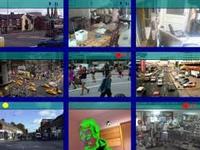-
Law-enforcement agencies eager for Web-surveillance tools

Private technology firms are pitching software capable of analyzing large swaths of the Internet to local law enforcement looking for ways to stop the next mass shooting or domestic terrorist event before it happens; police departments hope the software will help them detect online information from terrorists, traffickers, pedophiles, and rioters
-
-
NYPD monitoring of Muslim communities did not produce a single terrorist lead

An NYPDunit which gathers information on Muslim communities and businesses in order to uncover links to terrorist plots has been unable to do so in six years of engaging in monitoring Muslim communities in New York and New Jersey
-
-
NYPD, Microsoft develop and deploy new surveillance system
The New York Police Department (NYPD) and Microsoft have teamed up to create the Domain Awareness System, which will analyze real-time safety data for use by NYPD investigators; the system will act as a communications hub which will allow a number of advanced counterterrorism systems to relay information to more than 1,000 people in the field
-
-
Domestic terrorism by members of extremist groups a serious threat: FBI
The FBI and other government law-enforcement agencies have been convinced for a while that terrorism from extremist domestic organizations is just as dangerous as terrorism from foreign organizations, but efforts by authorities to detect and pre-empt violent extremists have faced serious legal and political hurdles, including free speech guarantees and pushback from political lobbies suspicious of the government’s motives
-
-
ONR sensor and software suite tracks, hunts down more than 600 suspect boats
A new sensor and software suite sponsored by the Office of Naval Research recently returned from West Africa after helping partner nations track and identify target vessels of interest as part of an international maritime security operation
-
-
A third Bell 412 helicopter delivered to NYPD for counterterrorism missions

The NYPD dedicated many hours to designing the specifications of the department’s third Bell 412 to meet the diverse needs of the police department; one of the counterterrorism additions to the Bell 412 is a radiation detection system that can identify radiation signatures from an altitude of 200 feet in an effort to protect the city from nuclear bomb threats
-
-
Computer-based methodology for cultural intelligence and security
Cultural differences are a major challenge facing intelligence agencies, researchers from Israel and the United States have developed computer-based methodology to improve knowledge, apply data, and better decipher these nuances and biases
-
-
DHS forced to release list terms it monitors on social media
Following a Freedom of Information Act (FOIA) request by the Electronic Privacy Information center (EPIC), DHS was forced to release its 2011 Analyst’s Desktop Binder; the binder, among other things, contains a list of words DHS uses as triggers of suspicious communication when the department’s analysts monitor social media
-
-
Reason-based behavioral recognition system wins award
A reason-based behavioral recognition system for video surveillance developed by Houston, Texas-based BRS Labs wins an award at London’s Counter Terror Expo
-
-
Security industry helps develop DOJ/DHS Suspicious Activity training video
The National Association of Security Companies says it endorses the DOJ/DHS Suspicious Activity Reporting (SAR) training video for private sector security personnel
-
-
DHS resisted calls for intelligence on Occupy movement
Internal documents released by DHS demonstrate the efforts made by the department to avoid gathering intelligence on last year’s Occupy movement
-
-
Bolstering police anti-child porn technology
Microsoft Corp. and NetClean the other day announced a joint effort to combat the sexual exploitation of children by making Microsoft PhotoDNA technology available and accessible to law enforcement agencies worldwide to help enhance child sex abuse investigations
-
-
Using people with cell phones as surveillance nodes
Eighty-eight percent of Americans now own a cell phone, forming a massive network that offers scientists a wealth of information and an infinite number of new applications; with the help of these phone users — and their devices’ cameras, audio recorders, and other features — researchers envision endless possibilities for gathering huge amounts of data
-
-
DHS seeks camera that sees hundreds of kilometers at once
DHS is interested in adding powerful military technology to its growing arsenal of surveillance equipment; the agency is considering new cameras that will be able to track and monitor several moving objects simultaneously over as much as four square miles
-
-
House grills DHS for monitoring Twitter, Facebook
Earlier this year reports surfaced that DHS had awarded General Dynamic an $11 million contract to engage in monitoring of social networks; members of both parties including blasted DHS officials for potentially violating the First Amendment and collecting information on citizens engaged in protected political speech
-
- All
- Regional
- Water
- Biometrics
- Borders/Immig
- Business
- Cybersecurity
- Detection
- Disasters
- Government
- Infrastructure
- International
- Public health
- Public Safety
- Communication interoperabillity
- Emergency services
- Emergency medical services
- Fire
- First response
- IEDs
- Law Enforcement
- Law Enforcement Technology
- Military technology
- Nonlethal weapons
- Nuclear weapons
- Personal protection equipment
- Police
- Notification /alert systems
- Situational awareness
- Weapons systems
- Sci-Tech
- Sector Reports
- Surveillance
- Transportation
Advertising & Marketing: advertise@newswirepubs.com
Editorial: editor@newswirepubs.com
General: info@newswirepubs.com
2010-2011 © News Wire Publications, LLC News Wire Publications, LLC
220 Old Country Road | Suite 200 | Mineola | New York | 11501
Permissions and Policies
Editorial: editor@newswirepubs.com
General: info@newswirepubs.com
2010-2011 © News Wire Publications, LLC News Wire Publications, LLC
220 Old Country Road | Suite 200 | Mineola | New York | 11501
Permissions and Policies
